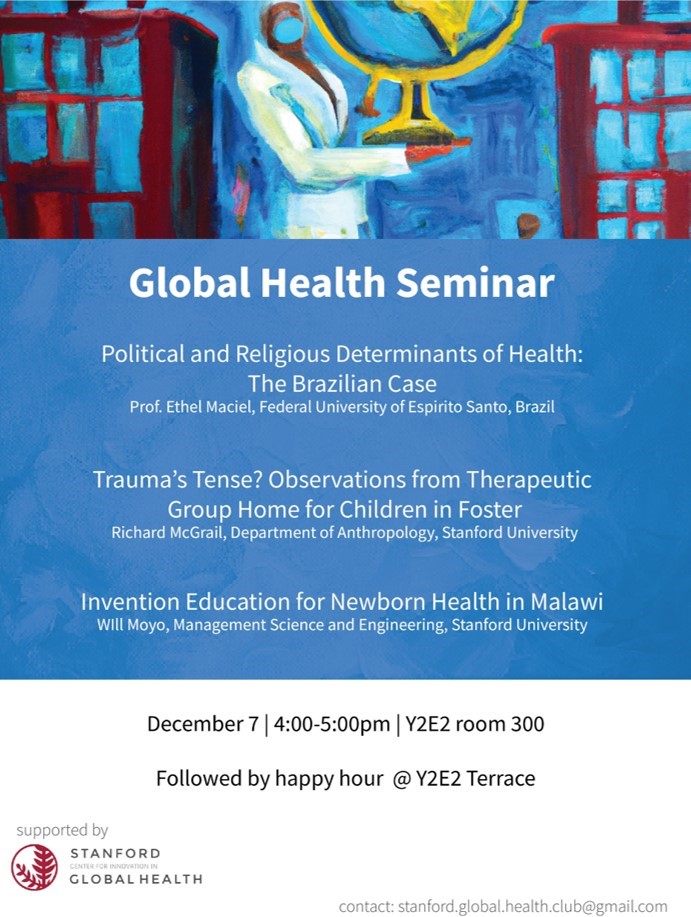Published: 12/07/2022
The Stanford Global Health Club is a new monthly seminar series organized by PhD students and postdocs for the Stanford community, designed to better understand challenges in global health and foster creative solutions.

The Global Health Club monthly seminar will take place on Wednesday December 7 at 4:00pm.
4:00pm room Y2E2 300 | seminar by Prof. Ethel Leonor Noia Maciel, from the Federal University of Espirito Santo, Brazil. | Title: POLITICAL AND RELIGIOUS DETERMINANTS OF HEALTH: THE BRAZILIAN CASE
Prof. Maciel is an Epidemiologist, with a PhD in Collective Health/Epidemiology from the State University of Rio de Janeiro (2004) and Postdoctoral in Epidemiology at Johns Hopkins University (2008). She was the vice-rector of the Federal University of Espírito Santo (UFES), in Brazil, from 2013 to 2020. Currently, she is a Full Professor at the Federal University of Espírito Santo and CNPq Research Productivity Scholar in Epidemiology. She is President of the Brazilian Tuberculosis Research Network (REDE-TB). Co-Holder of the Sérgio Vieira de Mello Chair of the United Nations High Commission for Refugees at UFES. Member of the Technical Advisory Group on Tuberculosis at the Ministry of Health in Brazil and of the World Health Organization (WHO) Technical Advisory Group on Tuberculosis. She currently works in the field of Public Health, with an emphasis on Epidemiology, acting mainly on the following topics: epidemiological methods, epidemiology of infectious diseases, analysis of epidemic control (COVID-19, Zika virus, yellow fever, Monkeypox) and in particular – the study of tuberculosis. She develops science dissemination activities and is currently a columnist for the newspaper A Gazeta and a commentator for CBN Vitoria. She is active in the cause of Women in Science.
4:30pm room Y2E2 300 | seminar by Richard McGrail, Stanford, Department of Anthropology | title: Trauma’s Tense? Observations from Therapeutic Group Home for Children in Foster Care
Richard McGrail is a PhD candidate in Department of Anthropology. Before starting his dissertation, Richard worked as a volunteer Court Appointed Special Advocate for a child in California’s foster care system. In this talk, he will share three observations that he found during his dissertation research: an 18-month ethnographic study of daily life inside two residential group homes for children in California’s foster care system. For the most part, all main three observations about trauma shared a common feature: that “trauma” is a stressful, scary, and/or painful event that happened in the past (tense)—one which has the ability to influence a person’s present (tense) behaviors in ways that will affect their future (tense) wellbeing. In other words, what happens in the present is best understood as an ongoing symptom of the past and as a potential predictor of the future. This account of trauma’s tense is somewhat mainstream in both American popular and clinical cultures. His question, though, is whether this account obscures the socio-cultural mechanisms of present-tense behavior? Is there more to present-tense behavior than trauma’s past?
4:45pm room Y2E2 300 | seminar by Will Moyo, Stanford, Management Science and Engineering| title: Invention Education for Newborn Health in Malawi
Will Moyo is a graduate student in Management Science and Engineering & Public Policy. Prior to joining Stanford, she worked as the Engineering Innovation Design Studio Manager for Rice 360 Institute for Global Health Technologies in Malawi. There, she worked with engineering faculty, clinicians and students at Malawi University of Science & Technology and at the Malawi University of Business & Applied Sciences implementing invention education. The design studios implement engineering education through support from Rice360, the Lemelson Foundation and Newborn Essential Solutions and Technologies (NEST360). She will present on the experience of training biomedical engineers and contributing to the innovation ecosystem in Malawi.
5:00pm Y2E2 Terrace | Discussion and happy hour!
Icebreaker activities, food and drinks
The seminar will be 07 December 2022, starting 4:00 pm PST, in Y2E2 300. For those who cannot make it in person, the zoom link is:
Zoom link:
Meeting ID: 991 4220 6810
Password: 815194